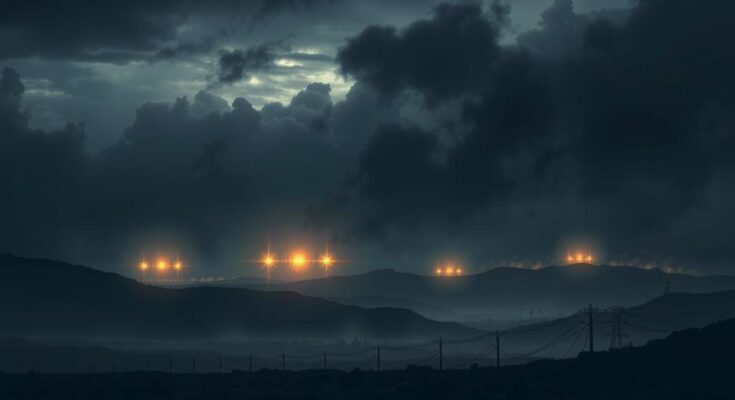Gunfire has intensified in Goma as Congolese troops face advanced M23 forces supported by Rwanda. The DRC accuses Rwanda of sending troops over the border, calling for UN sanctions. The situation worsens with reports of peacekeeper casualties and diplomatic relations deteriorating. A long-standing conflict is further complicated by competition for resources and ethnic tensions in eastern Congo.
Gunfire erupted in Goma, the capital of the Democratic Republic of Congo’s North Kivu province, on Sunday night as skirmishes intensified between the Congolese army and forces from the M23 Movement, which is itself supported by Rwanda. Shortly after nightfall, explosions were reported, signaling an escalation in conflict as accusations of a Rwandan troop buildup made headlines.
The DRC has condemned Rwanda for allegedly violating its sovereignty by sending additional troops into the country. In response to this aggression, Kinshasa has called upon the United Nations to enforce sanctions against Rwanda, which it claims is waging a “declaration of war” against the DRC.
Foreign peacekeepers have found themselves in peril amidst the violence, with several casualties reported. UN Secretary-General Antonio Guterres urged Rwanda to withdraw its forces, a call that was dismissed by the Rwandan government, which cited the need to maintain a defensive stance due to threats against its national security.
At an emergency UN Security Council meeting, the Congolese Foreign Minister described the influx of Rwandan troops as a blatant assault on DRC’s sovereignty. Reports estimate between 500 and 1,000 Rwandan soldiers have crossed into DRC, raising tensions between the two nations.
Diplomatic relations have soured, resulting in both countries withdrawing their respective diplomats. The situation regressed following the cancellation of peace talks between the leaders of Rwanda and the DRC, coinciding with the M23’s advances towards Goma, which is pivotal for Congolese minerals and hosts a large population of displaced individuals.
The conflict near Goma has seen the use of drone strikes and increased airstrikes, heightening concerns over civilian safety. Previous ceasefire agreements have repeatedly failed, exacerbating an already complex conflict involving various armed groups vying for control in eastern DRC.
The region has witnessed prolonged instability for over 30 years, compounded by the presence of rival factions and ethnic tensions. The violence has resulted in significant international involvement, with UN peacekeeping forces operating within the DRC. After the recent outbreak, multiple nations reported casualties, highlighting the perilous nature of the situation.
The ongoing conflict in eastern Congo is rooted in historical grievances and ethnic tensions, exacerbated by competition for mineral resources. Goma, a key urban center, has been caught in the crossfire between various armed groups, including the M23, previously active in the region and accused of receiving support from Rwanda. The complex interplay of local and international politics continues to fuel this crisis, which has tragic humanitarian implications for millions.
The situation in Goma underscores the escalating hostilities between the Democratic Republic of Congo and Rwanda, marked by fresh troop movements and accusations of warfare. Efforts for peace have repeatedly faltered amidst rising tensions as both nations grapple with complex historical and territorial disputes. Immediate international intervention remains critical to mitigate the conflict and protect the civilian population affected by ongoing violence.
Original Source: www.wyomingnewsnow.tv




